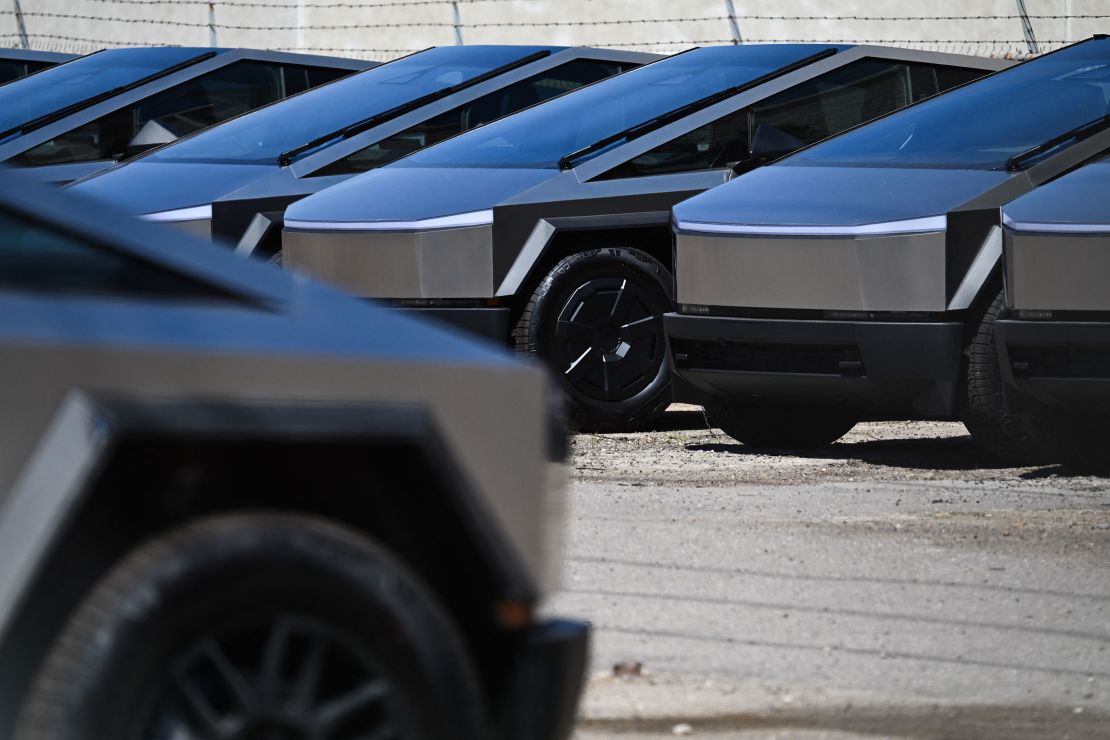A version of this story appeared in CNN Business’ Nightcap newsletter. To get it in your inbox, sign up for free here.
Elon Musk says he is back to “spending 24/7 at work” and sleeping in conference rooms — seemingly diving head-first back into corporate life after five months of oligarch larping in Washington.
That kind of performative overwork often comes across these days as eye-roll-worthy — another tech entrepreneur peacocking their devotion to The Grind. Musk is a longtime pusher of such “extremely hardcore” work cultures. But given the scale and severity of the problems hitting Musk’s business empire all at once, an all-out effort may be appropriate.
Tesla sales are tanking. The Cybertruck is shaping up to be a flop for the ages. The social media site X needs “major operational improvements,” according to Musk, after a widespread outage over the weekend, which came less than two weeks after xAI’s Grok briefly morphed into a conspiracy theorist that wouldn’t shut up about “White genocide.” And, late Tuesday, the latest multibillion-dollar SpaceX launch resulted in its Starship rocket spinning out of control and breaking up over the Indian Ocean.

Related article Tesla has a Europe problem
Investors appear relieved that Musk is refocusing on his day job(s). Shares of Tesla — the only publicly traded Musk-owned enterprise — have shot up 25% in the past month (though they are still in a hole relative to their December peak). That optimism is conditioned on Musk actually fixing the problems (many of them self-inflicted) plaguing the EV maker while also delivering on his promise to launch an autonomous robotaxi service in Austin, Texas, in the coming weeks.
It’d be a tall order for any CEO. It is a gargantuan ask for someone running multiple flailing companies at the same time.
A month ago, Tesla reported a 70% drop in earnings for the first quarter. That (along with a report in the Wall Street Journal that said Tesla’s board had gone shopping for a new CEO) seemed to be a wakeup call for the billionaire, whose foray into far-right politics turned out to be disastrous for the electric vehicle brand.

Data released Tuesday showed Tesla’s European sales fell by about 50% — the fourth month in a row of declining year-over-year sales for the company. There are two primary reasons why: Europeans are rejecting Musk’s personal politics, and choosing to buy much-cheaper EVs from Chinese carmakers such as BYD. (ICYMI: BYD is the brand Musk once scoffed at and is now eating Tesla’s lunch on the global stage.)
It remains to be seen how Musk will deal with the Cybertruck, his pet project that’s become a 7,000-pound albatross for Tesla, plagued by repeated recalls (including one for a piece of trim that was literally falling off the vehicle) and weak sales.
Two years ago, Musk said with a straight face that he expected to add 250,000 Cybertrucks a year to American roads. Tesla sold 40,000 of them last year. In the first quarter of this year, it sold only 6,400, according to Cox Automotive. If sales don’t pick up, Tesla is on track to notch only about one-tenth of its annual goal.

Related article Tesla faces a brand crisis. The one guy who can fix it is MIA
The Cybertrucks are losing value fast. Tesla only recently started allowing trade-ins, and two customers told Business Insider that their trade-in estimates amounted to roughly 37% depreciation after just a year.
On top of all that, Musk — who has a history of overpromising and missing deadlines by years — plans to launch Tesla’s driverless ride-hailing service next month in Austin. But already, questions are swirling about Tesla’s ability to pull that off. According to Fortune, “key groups — including Austin’s transportation department, Austin’s emergency first responders, and federal regulators — are still missing important information about the self-driving machines.”
The stakes are high.
Tech analyst Dan Ives, who has been uncharacteristically critical of Musk’s political involvement and its damage to the Tesla brand, said in a note last week that ”the vast majority” of Tesla’s valuation upside is centered on the success of its “autonomous vision taking hold.” The Austin event is the “beginning of this next era of growth for Musk and Tesla.”
CNN’s Anna Cooban contributed reporting.